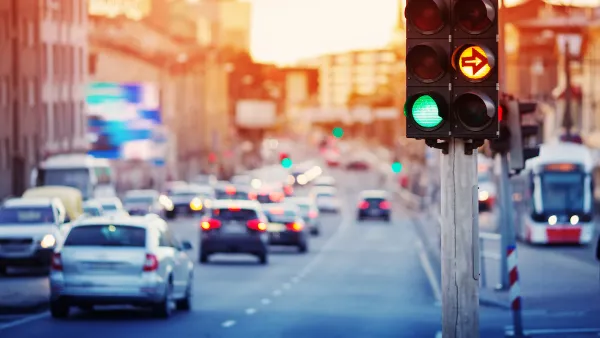Grist's David Roberts attended a national conference on the future of transportation at Ohio State in early May and noticed a divide in the concluding discussion on how panelists approached the issue of sustainability in transportation.
Roberts attended Moving Ahead 2010: Sustainable Transportation Solutions for the 21st Century from May 2-4. An impromptu panel discussion prompted by the Deepwater Horizon calamity and our oil dependence closed the conference. Roberts was struck by the two distinct approaches to transportation sustainability revealed in the discussion.
"On one side, you have people like Scott Bernstein of the Center for Neighborhood Technology, Geoff Anderson of Smart Growth America, or Tom Murphy of the Urban Land Institute, who are focused on using land and urban assets more effectively, which means increasing density and walkability, which means driving less, which means fewer cars.
"On the other side you have people whose focus is on reducing the ecological impact of individual cars." Their focus: "People are going to keep driving like they do now; how can we make their cars cleaner?"
After listening to the Honda spokesman discuss what he sees as the auto company's future presented by fuel cell technology, Roberts concludes: "Is that really the extent of our ambition? To switch out the internal combustion engine for some other widget and otherwise keep on motoring as usual? To maintain the patterns of land use and development we have, simply with cars that emit less pollution? The poverty of that vision is tragic."
FULL STORY: Does ‘sustainable transportation’ mean better cars or fewer cars?

National Parks Layoffs Will Cause Communities to Lose Billions
Thousands of essential park workers were laid off this week, just before the busy spring break season.

Retro-silient?: America’s First “Eco-burb,” The Woodlands Turns 50
A master-planned community north of Houston offers lessons on green infrastructure and resilient design, but falls short of its founder’s lofty affordability and walkability goals.

Delivering for America Plan Will Downgrade Mail Service in at Least 49.5 Percent of Zip Codes
Republican and Democrat lawmakers criticize the plan for its disproportionate negative impact on rural communities.

Test News Post 1
This is a summary

Test News Headline 46
Test for the image on the front page.

Balancing Bombs and Butterflies: How the National Guard Protects a Rare Species
The National Guard at Fort Indiantown Gap uses GIS technology and land management strategies to balance military training with conservation efforts, ensuring the survival of the rare eastern regal fritillary butterfly.
Urban Design for Planners 1: Software Tools
This six-course series explores essential urban design concepts using open source software and equips planners with the tools they need to participate fully in the urban design process.
Planning for Universal Design
Learn the tools for implementing Universal Design in planning regulations.
EMC Planning Group, Inc.
Planetizen
Planetizen
Mpact (formerly Rail~Volution)
Great Falls Development Authority, Inc.
HUDs Office of Policy Development and Research
NYU Wagner Graduate School of Public Service



























